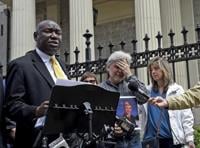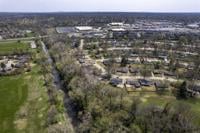BALTIMORE (AP) — After Maryland lawmakers recently eliminated the statute of limitations for child sex abuse lawsuits amid heightened scrutiny of the Archdiocese of Baltimore, civil rights attorney Ben Crump announced plans Tuesday to bring a series of civil claims on behalf of victims.
The threat of litigation comes as the the archdiocese faces continued fallout from released last month that found more than 150 priests and other clergy in the archdiocese sexually abused over 600 children with impunity. The report, which the Maryland Attorney General’s Office produced after a yearslong investigation, paints a damning picture of the nation’s oldest Catholic diocese.
Days after the report’s release, Gov. Wes Moore signed legislation to for child sex abuse lawsuits effective Oct. 1. Previously, victims couldn’t sue after turning 38.
Crump, best known for representing victims of police brutality, held a news conference Tuesday outside the Baltimore Basilica with attorney Adam Slater, his partner on some earlier high-profile sex abuse cases. Several potential plaintiffs shared their stories of abuse; some overlapped with findings of the attorney general’s investigation while others presented new allegations.
“You cannot outrun the trauma that was inflicted, no matter how hard they tried,” Crump told reporters. “Many of them — for years, for decades — believed it was their fault.”
A spokesperson for the archdiocese didn’t immediately respond to a request for comment Tuesday.
Marc Floto, one of the potential plaintiffs, said the attorney general’s investigation inspired him to come forward and speak publicly about childhood abuse he said caused “so many problems” in his life.
“Still to this day, I have so much anger, so much hate,” he said, sobbing silently between sentences. “The church needs to be held accountable.”
Floto displayed a printed photo of himself — in suit and tie, his blonde hair neatly combed — from around the time he said the abuse occurred.
The Associated Press typically does not name people who say they have been sexually assaulted unless they come forward publicly.
“This little boy had his innocence stolen,” Crump said.
Floto said he wasn’t interviewed for the attorney general’s investigation but his abuser, Father James Dowdy, is named in the report.
Ordained in 1969, Dowdy served in several Maryland parishes before abuse allegations surfaced in 1991, according to the report. He denied the allegations, saying it was nothing more than horseplay with boys, and apparently he faced no consequences.
Two years later, another man reported Dowdy had sexually abused him in the 1970s and ’80s. Dowdy was then placed on leave and his ministerial faculties were removed, the report says. Church officials agreed to pay the victim’s counseling and medication costs while simultaneously bankrolling Dowdy’s therapy, health care and living expenses for years. His expenses cost the church well over $100,000, more than 10 times what the victim received, according to the report. During therapy, Dowdy disclosed many more instances of abuse. Finally, in 1977, his church employment was terminated.
The Baltimore archdiocese has already paid more than $13.2 million for care and compensation for 301 abuse victims since the 1980s, including $6.8 million toward 105 voluntary settlements.
But the recent law change, including a provision making it retroactive, could allow for a deluge of additional lawsuits.
The Maryland Catholic Conference, representing the three dioceses serving the state, opposed the measure, arguing the retroactive window was unconstitutional and citing potentially devastating impacts on the Baltimore archdiocese and other institutions. Anticipating a court challenge, lawmakers included language in the bill that would further delay lawsuits until the Supreme Court of Maryland can determine whether it’s constitutional.
Several other states have passed similar legislation in recent years, and in some cases, resulting lawsuits have .
Also present at Tuesday’s news conference, former Maryland Sen. Tim Ferguson said he was 13 or 14 when a priest asked to take him fishing for the weekend. The guest bedroom was being renovated, the priest claimed, so they would have to share his bed.
Ferguson said he froze during the assault, then laid awake all night. He was afraid to report the abuse to his parents, worried what his father might do.
Joe Taylor said his abuser, Father Thomas Smith, would take boys on beach trips and make them swim with him in “dark waters.”
Smith’s name appears multiple times in the attorney general’s report, which said he both perpetrated abuse and helped protect other abusers in congregations across the Baltimore area. He died by suicide in 1993, not long after a second victim accused him of assault and filed a lawsuit against the archdiocese. The claim was later dismissed because of the statute of limitations, but a judge found the archdiocese committed a possible dereliction of duties in its handling of abuse cases.
The lawsuit came five years after Smith admitted to church officials that he had abused multiple boys in the 1960s — a revelation that was brushed under the rug, according to the report. Shortly after learning of the abuse, then-Archbishop William Borders wrote Smith a letter praising his “many fine years of priesthood” and ordering him “not to engage in any form of youth work,” according to the report.
Dozens more victims came forward after Smith’s death.
Taylor, who grew up in a devout Catholic family, said his own relatives didn’t believe him when he reported Smith’s abuse, believing priests to be infallible.
“Just a lifelong battle,” he said. “No amount of money can bring back 45 years of lost friends and family.”










































